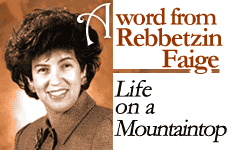 Vampire Weekend's Surprising Jewish Stories
Vampire Weekend's Surprising Jewish Stories


4 min read
4 min read
11 min read
5 min read
Intimacy is a magical God-given energy, with the potential for abuse, as one young wife painfully found out.
A parable is recounted about a community of people living on top of a mountain with steep cliffs all around them. Needless to say, in such a setting, all their movements and mobility were restricted. The children could not run and play ball for fear they or the ball would fall over the edge. Fear of falling severely limited their lives until a wise man came along and advised them to build a fence around the mountaintop. With a fence in place, they were able to enjoy all the freedoms that prudence previously had denied them.
Many people question the need for what seems to be the many rules, regulations and restrictions of Judaism, especially those that pertain to contact between the genders. That is, the laws of yechud and negia, prohibiting a man and woman not married to each other from being alone in a secluded place and from having casual physical contact.
The boundaries Judaism places between the sexes seem incongruous with an open society where men and women interact freely.
These boundaries seem incongruous with the open society in which we live, where men and women interact freely in co-ed colleges, co-ed dormitories and the workplace, and where there is hardly any stigma attached to virtually any form of intimacy, pre-marital, extra-marital, etc.
But the Torah sees it a bit differently. Far from prudish, the Torah's reasoning finds us playing on top of the mountain of life. We are taught by King Solomon: "The ways of the Torah are ways of pleasantness." [Proverbs 3:25] The Almighty wants us to relish life and take the utmost delight in the pleasures He has given us. Sexuality is seen as a positive force in Torah and described as a mighty river that irrigates and supplies necessary water to untold fields, makes things grow and blossom and brings things to fruition. But if it is misused, it becomes a raging floodwater that brings devastation and destruction.
A POWERFUL AND NECESSARY DRIVE
Similarly, the sexual tension between genders is seen as a most powerful and necessary drive. The Talmud relates that at one point in history when promiscuity was rampant, the Sages of Israel decided to use their spiritual influence to pray for the disarming of this powerful urge. The Talmud [Sanhedrin 64] relates that they succeeded, but then all of life came to a grinding halt. There was no desire, no interest, no spark between men and women, hence no intimacy. No baby was born, no life came into being. The Sages prayed again, and the normal tension between the genders was reinstated.
Sexual tension is indeed magical energy, the electricity that allows for the loftiest expression of love between a husband and wife.
This tension, if used appropriately, is indeed magical energy, the electricity that allows for the loftiest expression of love between a husband and wife. It can fuel a marriage with excitement and anticipation, making a husband and wife of many years, a new bride and groom every month. At the same time, if misplaced, it can cause mutilation of heart and soul and leave long-lasting scars.
A CASE IN POINT
The story of Mickey is a case in point.
A lovely woman of an unquestionably high-caliber, she came to see me this week. She related with great anguish the heartbreaking experience of her own unfortunate breach of a fence of halacha, Jewish law.
Tearfully she related her moment of tragedy. A young friend of hers had died leaving a husband and children. In an effort to offer assistance, she took precious time away from her family to console and provide for her friend’s bereaved survivors. Before she realized what was happening, notwithstanding her own relatively stable marriage, she became emotionally involved with the widower.
In the throes of a mission of solace, she found herself compromised in an act of infidelity.
In the throes of the mission of solace, she forgot the laws of yichud, which define the permissible physical proximity of unrelated males and females, and found herself compromised in an act of infidelity.
Mickey’s comment to me, when she calmed down, was how insightful and accurate a view the Torah has of human nature and human psychology.
She appreciated more than ever the concept of the mountain where the fences are there to protect us from falling off the precipice. She understood also that there are no exceptions to the rule -- not for the rabbis, the Sages, or the holiest of saints. All human beings are vulnerable and therefore must not place themselves in a context that could compromise them. No rationalizations are justified, not even for the sake of doing good. The Torah knows us and understands us better than we understand ourselves.
THE ROAD TO UNDERSTANDING
Mickey's road to recovery -- tshuva, "repentance" -- is a long and arduous one. She now understands the fences that are mandatory:
Life on the mountain, like everything else in life, can be the greatest blessing or a curse and heartbreak. It depends totally on our willingness to understand our own human nature. It requires our determination and commitment to discipline our behavior and respect the fences that Torah has provided, so that we may enjoy the wonders of life that God gave us.
